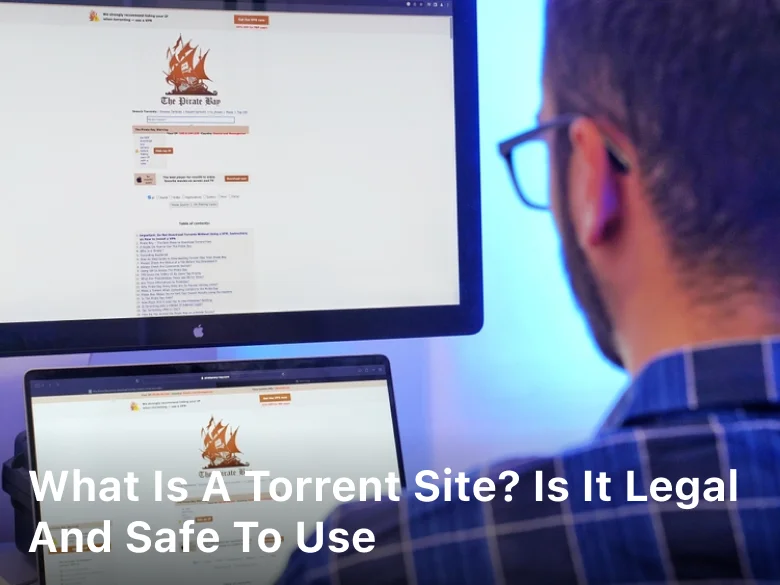What is a Torrent Site? Is it Legal and Safe to Use
What is a Torrent Site? Is it Legal and Safe to Use – Discover the world of torrent sites, how they work, and their legal aspects. Get insights into the torrenting community, its history, and benefits.
Torrent sites have become a ubiquitous term in the digital age, often associated with file sharing, downloading, and the exchange of various media. But what is a torrent site exactly, and how does it work?
In this comprehensive guide, we will delve into the fascinating world of torrent sites, exploring their history, mechanics, and legal implications. By the end of this article, you’ll have a clearer understanding of torrenting, its benefits, and its potential pitfalls.
What is a Torrent Site?
Torrent sites are online platforms that enable users to share and download files through a decentralized peer-to-peer network. Instead of relying on a single server to host files, torrents use a network of users (peers) who collectively contribute to the distribution of files. The term “torrent” refers to a small metadata file containing information about the files to be shared and a list of network locations for trackers.
How Do Torrents Work?
- Creating a Torrent File: To share a file, a user creates a torrent file using a torrent client. This file contains information about the file’s name, size, and structure, along with a list of trackers.
- Uploading the Torrent: The user uploads the torrent file to a torrent site, making it available to others.
- Downloading: Users interested in the file download the torrent file and open it with their torrent client.
- Peer-to-Peer Sharing: Once connected to the network, users download pieces of the file from other users (peers) who already have parts of it.
- Seeding: After downloading the entire file, users can choose to continue sharing it with others by keeping their torrent client open, a process known as “seeding.”

History of Torrenting
Torrenting, as we know it today, traces its roots back to the early 2000s when Bram Cohen developed the BitTorrent protocol. This innovative technology revolutionized file sharing by decentralizing the process, reducing the burden on individual servers, and increasing download speeds. Since then, torrenting has gained both popularity and notoriety.
Legal Aspects of Torrent Sites
The use of torrent sites can raise legal concerns, primarily related to copyright infringement. While torrent technology itself is not illegal, sharing copyrighted material without permission is.
Users must exercise caution and adhere to copyright laws when downloading or sharing files on torrent sites. Additionally, the legality of torrenting varies by country, making it essential to understand the legal landscape in your region.
Benefits of Torrenting
- Speed and Efficiency: Torrents allow for faster downloads, as users collectively contribute to file distribution.
- Accessibility: Torrents make it easy to access a wide range of content, including movies, music, software, and more.
- Resilience: The decentralized nature of torrents ensures that files remain available even if some peers go offline.
- Community: Torrenting communities foster camaraderie among users who share similar interests.
Risks and Concerns
- Copyright Violations: Downloading copyrighted material without permission can lead to legal consequences.
- Malware and Viruses: Torrent files can be a vector for malware, so it’s crucial to use trusted sources and maintain up-to-date antivirus software.
- Privacy: Torrenting exposes your IP address to other users, potentially compromising your privacy.
Is Torrent Site legal and Safe to Use?
Torrent sites themselves are not inherently illegal or unsafe. Torrenting is a legitimate technology that allows users to share files, such as open-source software, large datasets, and other content, efficiently. However, the legality and safety of using torrent sites depend on how they are used and the content being downloaded.
Here are some key points to consider:
Legal Use
- Torrenting is legal when used to share and download content that is in the public domain, has a Creative Commons license, or is explicitly authorized by the copyright holder.
- Downloading copyrighted material without authorization is illegal in many countries and can result in legal consequences, including fines and penalties.
Safety Concerns
- Many torrent sites host content that is pirated or contains malware. Downloading files from such sites can put your computer at risk of viruses, spyware, and other malicious software.
- Torrents also rely on a peer-to-peer network, which means you may be sharing your IP address with others, potentially exposing your identity to copyright enforcement agencies or hackers if proper precautions are not taken.
Use of VPN
To enhance safety and privacy when torrenting, it’s advisable to use a Virtual Private Network (VPN). A VPN can hide your IP address and encrypt your internet connection, making it more difficult for others to trace your online activities.
Legitimate Alternatives
Instead of using torrent sites for copyrighted content, consider using legal alternatives like streaming services, online stores, or platforms that offer content through proper licensing agreements.
In summary, torrent sites themselves are neutral tools, but their legality and safety depend on how they are used and the content they host.
Always make sure you have the legal right to download the content you are interested in, and take steps to protect your privacy and security while torrenting, such as using a reputable VPN and being cautious about the sources you download from.
FAQs
Q: Are all torrent sites illegal?
A: No, not all torrent sites are illegal. While many host copyrighted content without permission, some provide access to legal files such as open-source software and public domain materials.
Q: Is torrenting safe?
A: Torrenting can be safe if you use reputable torrent clients, avoid downloading copyrighted material without permission, and exercise caution when clicking on links or downloading files.
Q: Can I get caught torrenting?
A: Yes, you can get caught if you download copyrighted material without permission. Copyright holders often monitor torrent activity and may take legal action against infringers.
Q: What are the consequences of torrenting copyrighted material?
A: Consequences may include legal action, fines, and potential lawsuits by copyright holders. It’s essential to respect copyright laws.
Q: Are there legal alternatives to torrenting?
A: Yes, there are legal alternatives like streaming services, digital marketplaces, and libraries that offer access to content without copyright concerns.
Q: How can I protect my privacy while torrenting?
A: Use a VPN (Virtual Private Network) to hide your IP address, choose reputable torrent sites, and ensure your antivirus software is up to date.
Conclusion
In conclusion, torrent sites are a double-edged sword in the digital world, offering both convenience and potential legal pitfalls. Understanding the mechanics, history, and legal aspects of torrenting is essential for anyone considering engaging in this peer-to-peer file-sharing ecosystem. By adhering to copyright laws, using trusted sources, and protecting your privacy, you can safely navigate the torrenting landscape.




